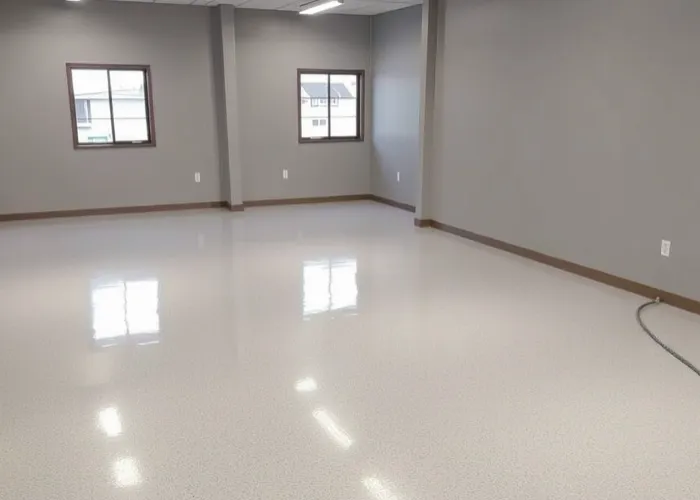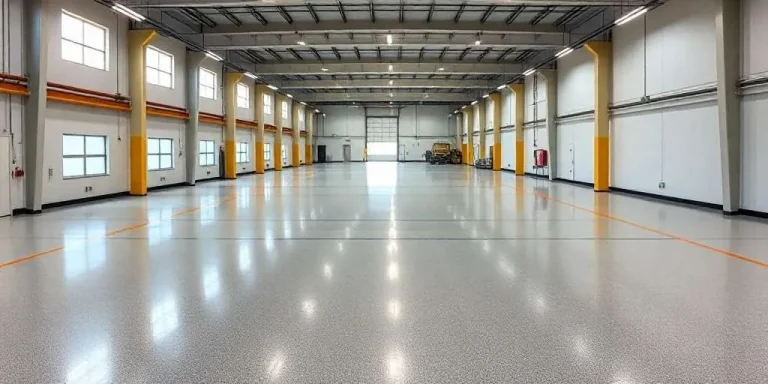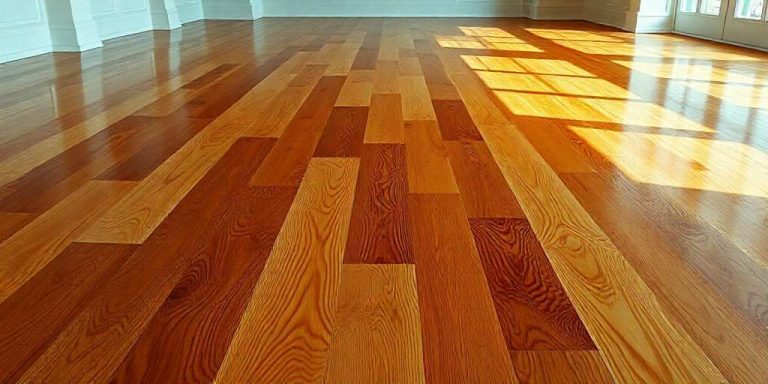Concrete vs Epoxy: Which Flooring Solution Is Right For Your Space?
Introduction
Welcome to the ultimate showdown: Concrete vs Epoxy. It’s like Batman versus Superman, but for your floors! Whether you’re renovating a cozy residential space or upgrading a bustling commercial area, the choice between concrete and epoxy flooring can make or break your aesthetic and functional goals. Let’s dive into this dynamic duo and uncover which flooring solution could be your best ally.
First off, let’s get one thing straight: both concrete epoxy flooring and traditional concrete have their own superpowers. Concrete is the sturdy backbone of many structures, renowned for its durability and strength. On the flip side, epoxy coatings can transform plain concrete into a dazzling display of colors and textures, offering not just beauty but also enhanced performance.
You might be wondering: what are the real differences? How do they stack up against each other in terms of durability, maintenance, aesthetics, and cost? Fear not! We’re about to break it all down so you can make an informed decision that suits your unique space.
Key Takeaway: Understanding the strengths of both concrete and epoxy solutions is crucial for making an informed choice for your flooring needs. From residential concrete epoxy applications to industrial-grade options, there’s a perfect fit for every scenario!
So grab your favorite beverage (we recommend something caffeinated) as we embark on this journey through the world of flooring solutions. By the end of this post, you’ll be armed with all the knowledge needed to choose between these two heavyweights in the flooring arena!
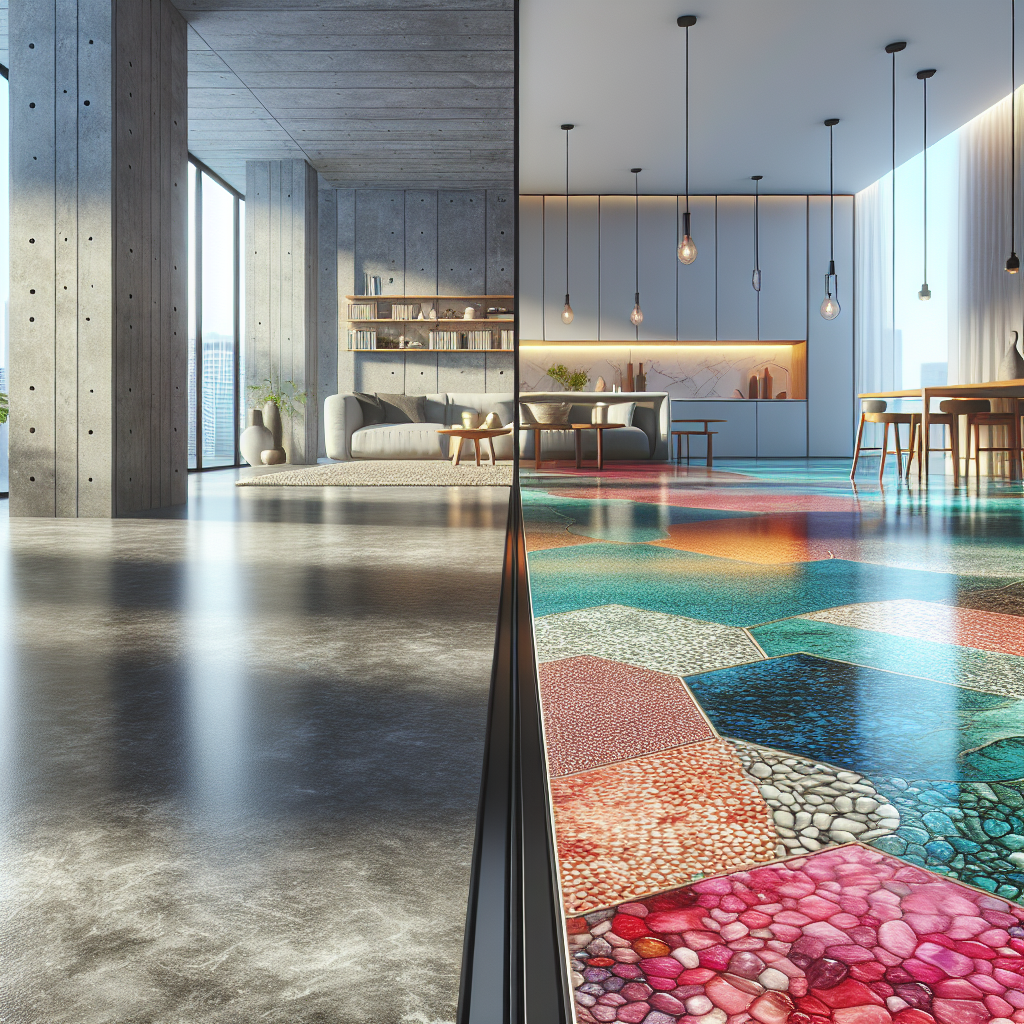
Understanding Concrete Flooring
Concrete flooring is like the unsung hero of the flooring world tough, reliable, and often overlooked. This versatile option can be found in everything from residential homes to industrial warehouses. Let’s dive into the nitty-gritty of concrete and epoxy solutions!
Overview of Concrete Flooring
Concrete flooring is made from a mixture of cement, water, and aggregates. It’s poured into place and can be finished in various ways to enhance its appearance and durability. Think of it as the blank canvas that can be transformed into a masterpiece with the right techniques.
Types of Concrete Flooring Options
- Polished Concrete: A sleek finish that’s perfect for modern spaces.
- Stained Concrete: Adds color and character, making it look like a work of art.
- Textured Concrete: Offers slip resistance, ideal for outdoor areas.
- Decorative Concrete Epoxy: Combines aesthetics with durability for stunning results.
Benefits of Concrete Flooring
The perks of concrete flooring are as solid as the material itself! Here are some key benefits:
- Durability: It can withstand heavy foot traffic and is resistant to scratches.
- Low Maintenance: A quick sweep or mop keeps it looking fresh!
- Energy Efficiency: Its thermal mass helps regulate indoor temperatures.
- Eco-Friendly Options: Many concrete mixes now include recycled materials.
Common Uses for Concrete Floors
You’ll find concrete flooring in various settings, including:
- Residential Spaces: Living rooms, kitchens, and basements love a good concrete makeover!
- Commercial Areas: Retail stores and offices benefit from its durability.
- Industrial Facilities: Warehouses and factories rely on its strength for heavy machinery.
- Outdoor Patios: With waterproofing options, outdoor concrete epoxy coatings shine!
If you’re considering a floor upgrade, remember: concrete flooring is not just about being functional; it also offers endless design possibilities! Whether you want a polished look or a textured finish, there’s a concrete solution waiting for you!
Exploring Epoxy Flooring
Welcome to the dazzling world of epoxy flooring, where your floors can be as vibrant as your personality! If you thought concrete was just a dull gray slab, think again. Epoxy is here to jazz things up!
What is Epoxy Flooring?
At its core, epoxy flooring is a high-performance coating made from a mixture of resin and hardener. When these two components are combined, they create a chemical reaction that results in a tough, durable surface that’s perfect for various environments. Think of it as giving your concrete floors a superhero cape!
Types of Epoxy Flooring Solutions
- Residential Concrete Epoxy: Ideal for homes, offering aesthetic appeal and durability.
- Commercial Concrete and Epoxy: Designed for high-traffic areas, these solutions withstand wear and tear.
- Industrial Concrete Epoxy: Built to handle heavy machinery and harsh conditions.
- Decorative Concrete Epoxy: Perfect for adding flair with colored finishes or unique textures.
- Garage Floor Epoxy on Concrete: A popular choice for homeowners looking to revamp their garages.
- Outdoor Concrete Epoxy Coating: Weather-resistant options that protect against UV rays and moisture.
Advantages of Epoxy Coatings
The benefits of choosing epoxy over plain concrete are numerous. Here are just a few:
- Durability: It’s resistant to impacts, chemicals, and stains perfect for those messy spills!
- Seamless Finish: Say goodbye to cracks and joints; epoxy provides a smooth surface that’s easy to clean.
- Aesthetic Variety: With options ranging from clear epoxy for concrete surfaces to vibrant colored finishes, you can customize your space like never before!
- Slip Resistance: Many epoxy coatings come with anti-slip properties, making them safe even when wet.
- Eco-Friendly Options: Some products are designed with sustainability in mind goodbye guilt!
Applications of Epoxy Flooring in Various Spaces
The versatility of epoxy flooring means it can shine in many settings. Here’s where you might find it:
- Bases & Garages: Provides an attractive finish while being tough enough for cars and tools.
- Kitchens & Restaurants: Easy-to-clean surfaces that resist staining from food spills.
- Bathrooms & Basements: Waterproofing with concrete and epoxy ensures no water damage here!
- Atriums & Showrooms: Decorative concrete epoxy can make any space feel luxurious.
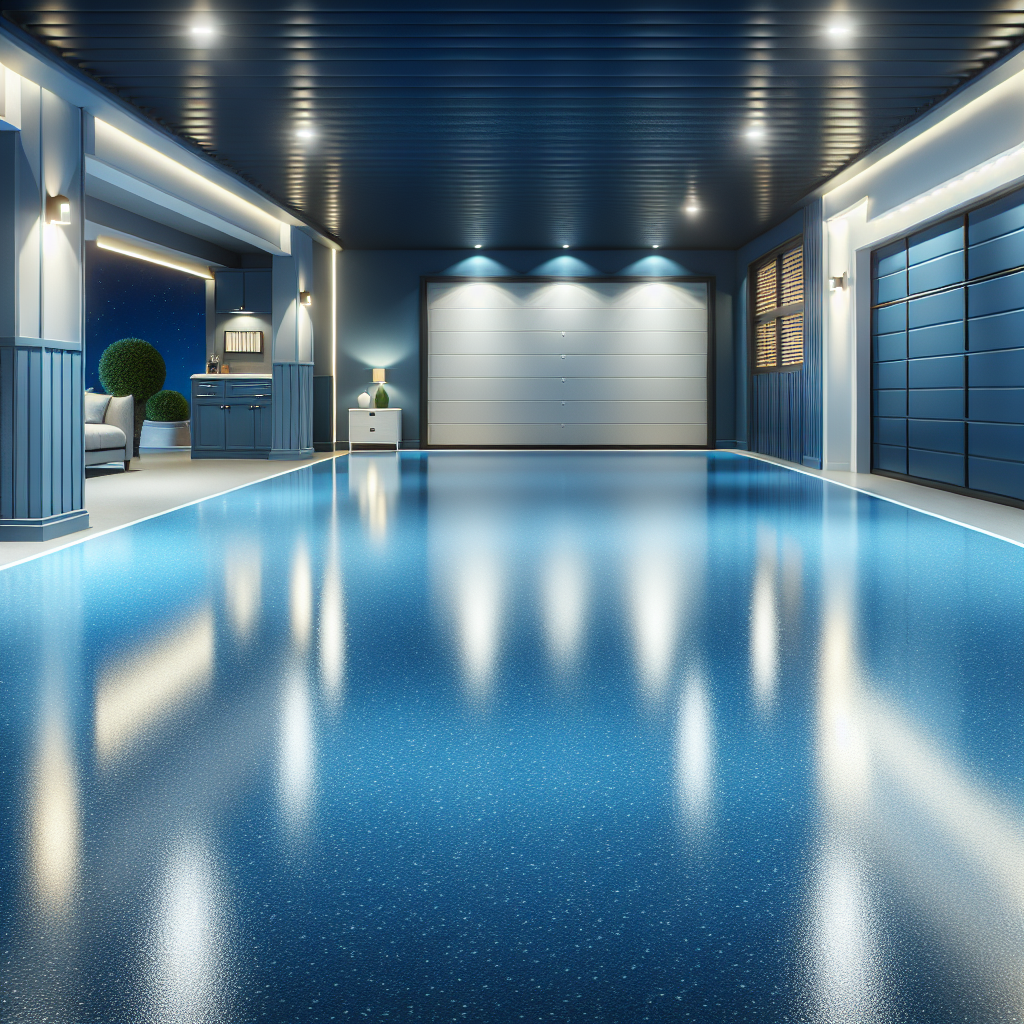
Remember: Choosing the right contractor is crucial! Work with experienced concrete and epoxy contractors who understand your vision.
Comparing Durability and Maintenance
When it comes to flooring, durability is the name of the game. After all, who wants to be replacing their floors every few years? Let’s dive into how concrete and epoxy stack up against each other in this arena.
Differentiating Durability between Concrete and Epoxy
First off, concrete is like that reliable friend who always shows up on time. It’s tough, sturdy, and can withstand heavy loads perfect for high-traffic areas like garages or warehouses. However, it does have its Achilles’ heel: cracks. Over time, environmental factors can cause concrete to chip or crack, leading to potential water damage or worse.
On the flip side, epoxy for concrete floors is like a superhero in disguise. When you apply an epoxy concrete coating, you’re not just adding a pretty face; you’re enhancing durability significantly. Epoxy creates a seamless barrier that resists stains, chemicals, and even moisture making it an ideal choice for industrial settings where spills are common.
Maintenance Requirements for Each Solution
Now let’s talk maintenance. Concrete requires regular sealing to keep those cracks at bay and should be cleaned with pH-neutral cleaners to avoid damaging the surface. It’s a bit like maintaining a classic car; it looks great but needs some TLC.
Epoxy flooring? Much easier! A simple sweep and occasional mopping will do wonders to keep your surfaces looking sharp. Plus, if you ever need repairs due to wear or tear (which is rare), concrete epoxy repair can be done seamlessly without needing a complete overhaul.
Lifespan and Longevity Considerations
In terms of lifespan, concrete typically lasts about 30-50 years with proper care not too shabby! However, when you add an epoxy coating into the mix? You could easily push that lifespan closer to 20 years or more without significant degradation in quality. It’s like getting a bonus round in your favorite video game!
Key Takeaway: If you’re looking for durability paired with low maintenance, consider opting for epoxy solutions over standard concrete options.
In conclusion, while both materials have their merits, if you want maximum durability with minimal upkeep especially in high-demand environments then investing in decorative concrete epoxy or even garage floor epoxy on concrete could be your best bet!
Aesthetic Options: Concrete vs Epoxy
When it comes to flooring, aesthetics can be as important as durability. After all, nobody wants their floor to look like a prison cell (unless that’s your vibe). So let’s explore the delightful world of concrete and epoxy aesthetics!
Design Flexibility with Concrete Finishes
Concrete isn’t just a gray slab waiting to be covered up; it’s a blank canvas! With options like stamped concrete, polished finishes, and various textures, you can create everything from rustic charm to modern minimalism. Want to mimic the look of natural stone? You got it! Fancy some vibrant colors? Easy peasy! The world of decorative concrete opens up endless possibilities.
Epoxy Coating Colors and Textures Available
If you thought concrete had the monopoly on creativity, think again! Epoxy coatings come in a rainbow of colors and textures. Whether you want a high-gloss finish that shines like a diamond or a matte look that whispers sophistication, epoxy can deliver. Plus, with options for metallic finishes or even glitter (yes, glitter!), your floor can become the talk of the town.
Decorative Options for Both Materials
The beauty of choosing between concrete and epoxy is that you don’t have to settle for boring. Here are some fun ideas:
- Colored Concrete Epoxy Finishes: Mix and match hues for a unique design.
- Textured Surfaces: Add depth with patterns or raised designs.
- Seamless Floor Solutions: Say goodbye to grout lines with poured epoxy systems.
- Outdoor Concrete Epoxy Coating: Make your patio pop while ensuring durability against the elements.
Pro Tip: Consider using eco-friendly concrete and epoxy options if sustainability is high on your priority list. Many modern products are designed to minimize environmental impact while still looking fabulous!
No matter what aesthetic direction you choose, both concrete and epoxy offer impressive versatility in style. Whether you’re aiming for an industrial chic vibe or something more traditional, these flooring solutions can elevate your space from drab to fab!

Chemical Resistance and Safety Features
When it comes to flooring, especially in environments where spills and chemicals are common, the chemical resistance of your flooring solution can be a game-changer. Let’s dive into how concrete and epoxy stack up in this department.
Chemical Resistance Properties of Epoxy Coatings
Epoxy coatings are known for their impressive ability to resist a variety of chemicals. Whether you’re dealing with oil, solvents, or even harsh cleaning agents, epoxy for concrete floors provides a robust barrier. This makes it an ideal choice for:
- Industrial settings: Think factories where spills happen more often than coffee breaks.
- Commercial kitchens: Where grease and food acids try to make a mess of things.
- Garage floors: Because who hasn’t spilled a little motor oil?
Safety Features in Concrete and Epoxy Solutions
Safety shouldn’t be an afterthought; it’s paramount! Both concrete and epoxy solutions come with their own set of safety features:
- Slip Resistance: Many epoxy coatings offer slip-resistant finishes, making them perfect for high-traffic areas or wet locations. You wouldn’t want your floor to become an impromptu skating rink!
- Heat Resistance: Industrial-grade epoxies can withstand high temperatures, which is crucial in settings like restaurants or manufacturing plants.
- Avoiding Static Build-Up: Anti-static properties are available in certain epoxy options, making them suitable for sensitive electronic environments.
Fun Fact: Did you know that some concrete and epoxy systems can be tailored for specific safety needs? For instance, you can have textured surfaces that enhance traction while still looking sleek!
The Slip-Resistant Factor
No one wants to end up on the floor (unless it’s during a dance-off). Both concrete and epoxy can be treated to enhance slip resistance, but the methods vary:
- Concrete: Can be polished or coated with anti-slip additives.
- Epoxy: Often comes with built-in slip-resistant textures that don’t compromise on aesthetics.
If you’re considering waterproofing with concrete and epoxy solutions, remember that both options provide excellent water resistance when properly sealed. This is particularly important for areas like basements or outdoor spaces where moisture is a concern.
Cost Considerations: Concrete vs Epoxy Flooring Solutions
When it comes to flooring, the price tag can often be the deciding factor. So, let’s break down the costs of concrete and epoxy solutions to see which one gives you the biggest bang for your buck!
Initial Installation Costs Comparison
The initial investment for your flooring can vary widely based on several factors, including material choice, labor, and location. Here’s a quick overview:
| Flooring Type | Estimated Cost per Square Foot |
|---|---|
| Concrete Flooring | – |
| Epoxy Flooring | – |
As you can see, while concrete may have a lower upfront cost, the price of epoxy can vary significantly depending on the type of epoxy coating used. For example, high-performance industrial concrete epoxy might set you back more initially but could save you in maintenance costs down the road.
Long-Term Value and ROI Analysis for Both Options
Consider this: While concrete may be cheaper to install, it often requires regular maintenance and repairs (hello, cracks!). On the flip side, investing in a quality epoxy for concrete floors could yield better long-term returns due to its durability and low upkeep.
- Concrete: Prone to stains and damage; may need sealing or resurfacing.
- Epoxy: Resistant to wear and tear; often comes with warranties that ensure longevity.
This means that while you might shell out a bit more initially for epoxy coatings like decorative concrete epoxy or garage floor epoxy on concrete, they tend to pay off in terms of durability and aesthetic appeal over time.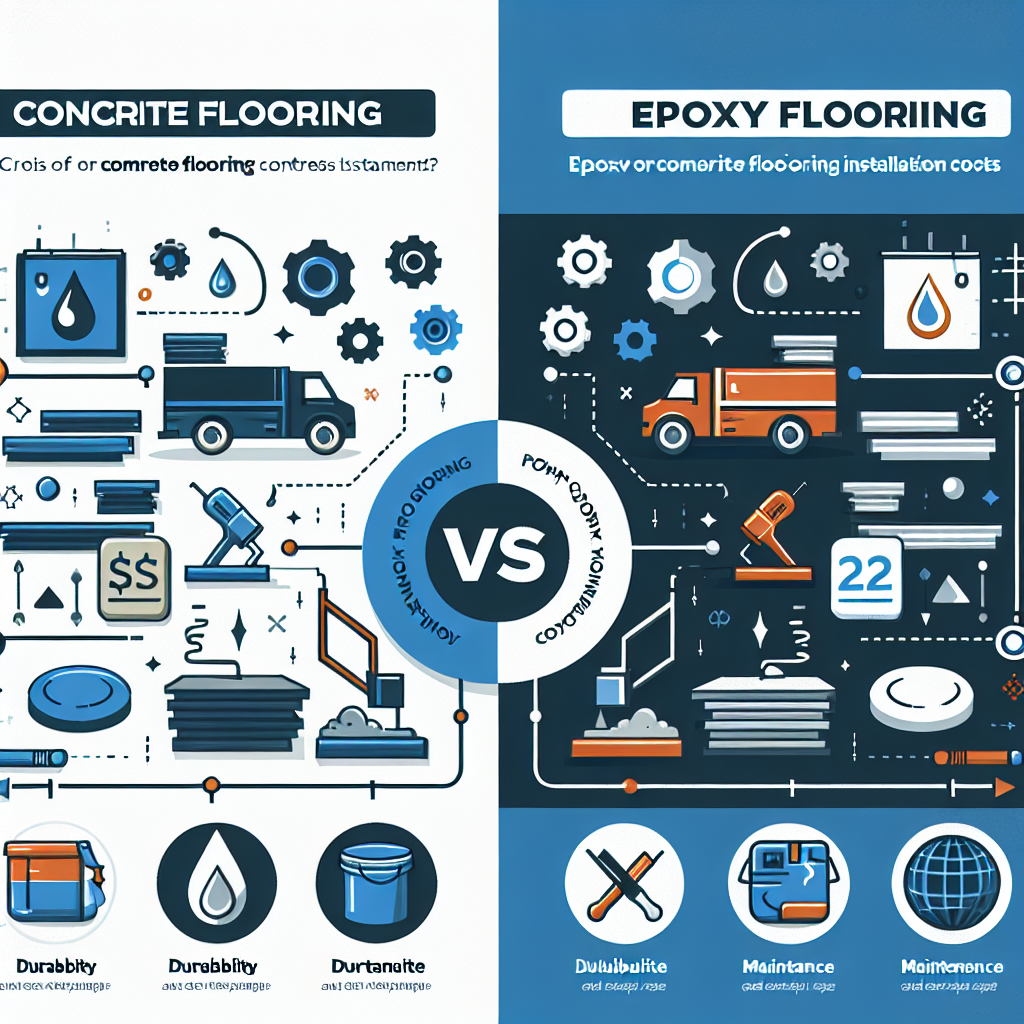
In conclusion, if you’re looking at short-term savings, concrete might seem appealing. But if you want a durable floor that can withstand the test of time (and your kids or pets), investing in quality epoxy solutions is likely worth every penny.
Your final decision should consider both initial costs and long-term benefits. So weigh your options carefully before making that leap into either world of concrete or epoxy!
Sustainability and Eco-Friendliness of Materials
When it comes to flooring, sustainability is not just a buzzword it’s a necessity. Both concrete and epoxy solutions have made significant strides in becoming more eco-friendly. Let’s dig into the green side of these materials.
- Eco-Friendly Options: Many manufacturers now offer eco-friendly versions of concrete epoxy flooring. These options often utilize recycled materials, reducing the carbon footprint associated with traditional products.
- Sustainable Practices: The installation processes for both concrete and epoxy can be optimized to minimize waste. For instance, using fast-curing concrete and epoxy products can reduce energy consumption during application.
- Waterproofing with Concrete and Epoxy: Waterproofing is essential for longevity, especially in areas like basements or garages. Eco-friendly waterproofing options are available that enhance durability without harmful chemicals.
- Durable Systems: The longevity of both materials means less frequent replacements, which is a win for sustainability. High-performance concrete epoxy systems can last decades, reducing the need for new materials over time.
Did you know? Using decorative concrete epoxy finishes not only beautifies your space but also contributes to sustainability by using fewer resources compared to traditional flooring options!
Another aspect to consider is the energy efficiency of production methods. Many companies are now prioritizing renewable energy sources in their manufacturing processes for both concrete and epoxy solutions. This shift not only helps reduce emissions but also supports a more sustainable economy.
For those looking at residential or commercial projects, partnering with reputable concrete and epoxy contractors who prioritize eco-friendly practices can make a significant difference. They can guide you toward sustainable choices that fit your needs while being kind to Mother Earth.
In conclusion, whether you’re leaning towards concrete or opting for an epoxy finish, there are plenty of sustainable choices available that don’t compromise on quality or aesthetics. So go ahead make your floor as eco-conscious as it is beautiful!


